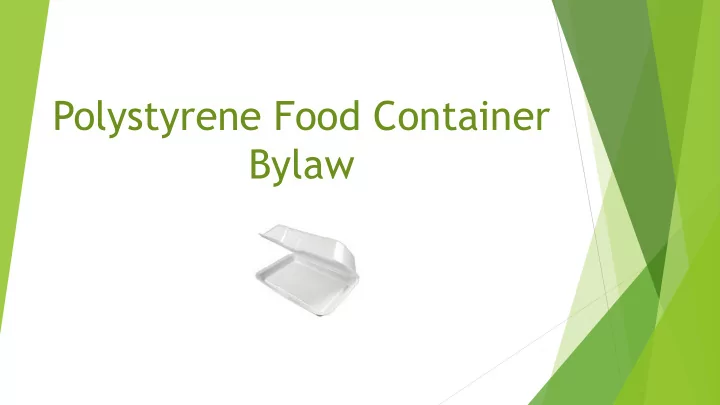

Polystyrene Food Container Bylaw
End Goals for Product Materials Sustainable (throughout the lifecycle): Manufacture : Natural materials (preferably rapidly renewable and recycled) Service : Reusable / durable End of life : Biodegradable or else recyclable (convenient, closed loop) zero waste Non-toxic (to all organisms)
What is Polystyrene? Form of petroleum based plastic that can be made into a foam (often referred to by the Dow Chemical trademark name as “Styrofoam”.) Polystyrene can also be made into a stiff plastic (often used for containers, lids, straws and utensils) In the food service industry is it most commonly used to make food and beverage containers and associated items It is identified by a #6 recycling symbol. PS www.dartcontainer.com
The case against Polystyrene Health Effects: Polystyrene is based on styrene, a neurotoxin and probable carcinogen. Polystyrene is the only plastic used in food packaging that is based on a carcinogen Polystyrene products may leach styrene when exposed to hot or greasy foods Styrene residues are found in 100% of human fat tissue samples Manufacturing polystyrene is highly hazardous for factory workers Environmental Effects: Polystyrene does not biodegrade. In its foam form it is very bulky, so it takes up a lot of room in landfills. Estimates of longevity range from hundreds to thousands of years. Even when properly disposed, polystyrene often ends up as litter due to its light weight. Production produces a large amount of hazardous waste and air pollution Polystyrene items harm wildlife. At least 267 marine species worldwide have been reported to have been affected by polystyrene litter Polystyrene is made from non-renewable fossil fuels (oil and natural gas).
Polystyrene cannot be recycled The recycling triangle is not appropriate for type 6 plastic (polystyrene) PS
“Why are we taking fossil fuels that need millions of years to create, turn them into an item that is used for a few minutes and can then damage the environment for a 1000 years?”
Overview of the Polystyrene Food Container Bylaw Eliminates for the use of polystyrene (Styrofoam and other forms) for food and beverage containers for prepared foods and associated service items such as lids, straws and utensils Encourages the use of environmentally friendly alternatives Allows the use other non toxic forms of plastic for prepared food and beverage containers Preserves the use of polystyrene packaging for meats (typically found in a grocery store), egg cartons, etc. and for sale to consumers
No Longer Acceptable Polystyrene Products: www.webstaurants.com / www.brenmarco.com
There are many alternatives available Recycled Paper Products Conventional/Virgin Paper Products Foil products Compostable products Biodegradable Products Recycled Plastic Products
Alternative Plastics PET / PETE Polyethylene: Polypropylene: Dartcontainer.com
Other Alternatives #7 Miscellaneous plastics - PLA polylactic acid - A biodegradable and • bioactive polyester derived from renewable resources such as corn starch • Relatively low melting point of 140 degrees F Ecoproducts.com/ vegware..com
A few examples of Alternative Suppliers Page 12
Are alternatives more expensive? Not significantly according to this chart from 2012 A resource for food establishments: Green Restaurant Association http://www.dinegree n.com/
Positive Thinking about alternatives One Wayland restaurant owner’s first reaction was that the price difference would be significant and that he would have to charge an extra fee for takeout. He is going to investigate with his suppliers. But then he reflected (on his own) that customers don’t like paper cups because they are hot to hold and don’t hold the heat as well as Styrofoam. He thought that maybe he would sell reusable thermos-type containers and offer customers a discount if they brought in their own hot beverage container. This is the type of positive thinking that should be encouraged!
Possible Concerns Will this hurt Wayland businesses? What is the cost to the Town? How is the ban enforced? Are there bans in other towns?
Businesses do need time to adapt The effective date is January 1, 2018 This gives restaurants 8 months after town meeting to use up existing inventory and stock alternatives A restaurant can request up to 6 months extension if this is a hardship
What is the cost to the town? How is the ban enforced? There should be little cost to the town Outreach and education for Wayland food establishments can be done by Transition Wayland with cooperation and support by Board of Health The town will benefit from reduced waste disposal cost at the transfer station Enforcement, if needed, would be done by BOH For monitoring, the BOH can elect to rely entirely on citizen complaints BOH already inspects restaurants – little extra effort would appear to be needed to check the containers used by those establishments that offer takeout? Once a restaurant stocks alternatives there is little probability of going against the bylaw and reverting to polystyrene National chain establishments such as Dunkin’ Doughnuts will surely comply Compliance has not been an issue in other towns that have banned polystyrene
Amherst Polystyrene is bad stuff Brookline Cambridge We can live without it Concord 20 Massachusetts cities and towns have polystyrene bans Dennis The list is growing, Wayland should be one of them Great Barrington Hamilton Wayland is not breaking new ground Ipswich Lee Lenox-BoH Marblehead Nantucket Pittsfield Somerville South Hadley-BoH Westfield-BoH Questions? Westford Williamstown Winthrop
Recommend
More recommend